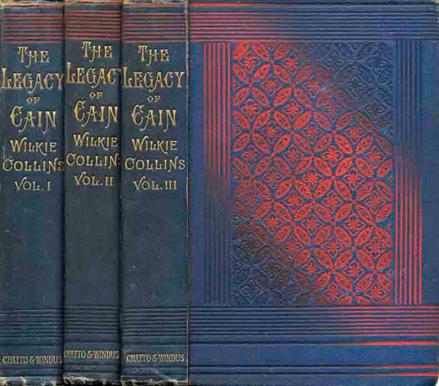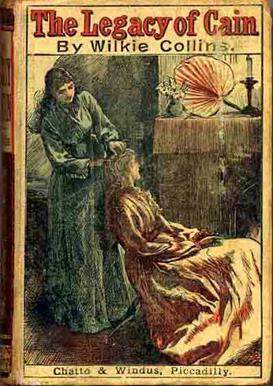Complete Works of Wilkie Collins (1349 page)
Read Complete Works of Wilkie Collins Online
Authors: Wilkie Collins
I say there
was
good in that suffering man; and I thank God I was not quite wrong about him after all. Arriving at Mr. Stephen Toller’s country seat, by the earliest train that would take me there, I found a last trial of endurance in store for me. Cristel was away with her uncle, visiting some friends.
Cristel’s aunt received me with kindness which I can never forget. “We have noticed lately that Cristel was in depressed spirits; no uncommon thing,” Mrs. Stephen Toller continued, looking at me with a gentle smile, “since a parting which I know you must have felt deeply too. No, Mr. Roylake, she is not engaged to be married — and she will never be married, unless you forgive her. Ah, you forgive her because you love her! She thought of writing to tell you her motives, when she visited her father’s grave on our return to England. But I was unable to obtain your address. Perhaps, I may speak for her now?”
I knew how Lady Rachel’s interference had appealed to Cristel’s sense of duty and sense of self-respect; I had heard from her own lips that she distrusted herself, if she allowed me to press her. But she had successfully concealed from me the terror with which she regarded her rejected lover, and the influence over her which her father had exercised. Always mindful of his own interests, the miller knew that he would be the person blamed if he allowed his daughter to marry me. “They will say I did it, with an eye to my son-in-law’s money; and gentlefolks may ruin a man who lives by selling flour.” That was how he expressed himself in a letter to his brother.
The whole of the correspondence was shown to me by Mrs. Stephen Toller.
After alluding to his wealthy brother’s desire that he should retire from business, the miller continued as follows:
“What you are ready to do for me, I want you to do for Cristy. She is in danger, in more ways than one, and I am obliged to get her away from my house as if I was a smuggler, and my girl contraband goods. I am a bad hand at writing, so I leave Cristy to tell you the particulars. Will you receive her, brother Stephen? and take care of her? and do it as soon as possible?”
Mr. Stephen Toller’s cordial reply mentioned that his vessel was ready to sail, and would pass the mouth of The Loke on her southward voyage. His brother caught at the idea thus suggested.
I have alluded to Giles Toller’s sly look to his lodger, when I returned the manuscript of the confession. The old man’s unscrupulous curiosity had already applied a second key to the cupboard in the lodger’s room. There he had found the “criminal stories” mentioned in the journal — including the story of abduction referred to by Lady Rachel. This gave him the very idea which his lodger had already relied on for carrying Cristel away by the river (under the influence, of course, of a soporific drug), while her father was keeping watch on the road. The secreting of the oars with this purpose in view, had failed as a measure of security. The miller’s knowledge of the stream, and his daughter’s ready courage, had suggested the idea of letting the boat drift, with Cristel hidden in it. Two of the yacht’s crew, hidden among the trees, watched the progress of the boat until it rounded the promontory, and struck the shore. There, the yacht’s boat was waiting. The rocket was fired to re-assure her father; and Cristel was rowed to the mouth of the river, and safely received on board the yacht. Thus (with his good brother’s help) the miller had made the River his Guilty accomplice in the abduction of his own child!
When I had read the correspondence, we spoke again of Cristel.
“To save time,” Mrs. Stephen Toller said, “I will write to my husband to-day, by a mounted messenger. He shall only tell Cristel that you have come back to England, and you shall arrange to meet her in our grounds when she returns. I am a childless woman, Mr. Roylake — and I love her as I should have loved a daughter of my own. Where improvement (in external matters only) has seemed to be possible, it has been my delight to improve her. Your stepmother and Lady Rachel will acknowledge, even from their point of view, that there is a mistress who is worthy of her position at Trimley Deen.”
When Cristel returned the next day, she found that her uncle had deserted her, and suddenly discovered a man in the shrubbery. What that man said and did, and what the result of it was, may be inferred if I relate a remarkable event. Mrs. Roylake has retired from the domestic superintendence of Trimley Deen.

Published in 1888, this was the last novel completed by Collins.
It is dedicated to Mrs Henry Powell Bartley (Carrie Graves), acknowledging her skill and patience in copying manuscripts for the printer.
The Legacy of Cain
explores the theme of hereditary evil, and attacks the idea that ‘bad blood’ necessarily results in a criminality.
The main story begins in 1875.
Helena and Eunice are sisters brought up by their father, the Reverend Abel Gracedieu.
He has deliberately kept them in ignorance of their true ages because the elder daughter was adopted in 1858, after her natural mother was executed for the brutal murder of her husband.
The story’s main narrator is the prison governor who always feared the adoption would end badly because of the taint of inherited evil.

The first edition

THE LEGACY OF CAIN.
CONTENTS
First Period: 1858-1859. EVENTS IN THE PRISON, RELATED BY THE GOVERNOR.
CHAPTER I. THE GOVERNOR EXPLAINS.
CHAPTER II. THE MURDERESS ASKS QUESTIONS.
CHAPTER III. THE CHILD APPEARS.
CHAPTER IV. THE MINISTER SAYS YES.
CHAPTER V. MISS CHANCE ASSERTS HERSELF.
CHAPTER VI. THE DOCTOR DOUBTS.
CHAPTER VII. THE MURDERESS CONSULTS THE AUTHORITIES.
CHAPTER VIII. THE MINISTER SAYS GOOD-BY.
CHAPTER IX. THE GOVERNOR RECEIVES A VISIT.
CHAPTER X. MISS CHANCE REAPPEARS.
Second Period: 1875. THE GIRLS AND THE JOURNALS.
CHAPTER XVIII. EUNICE’S DIARY.